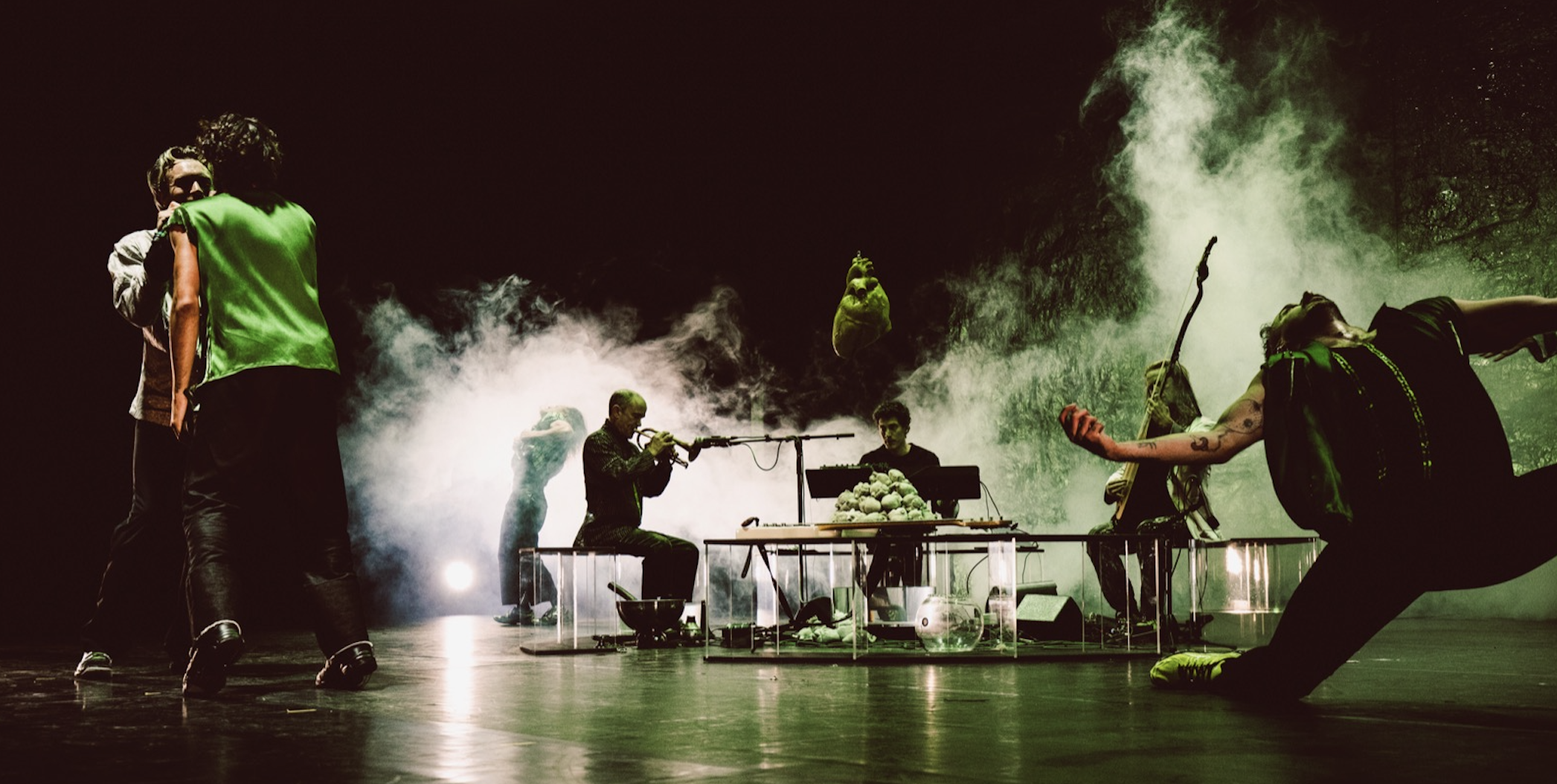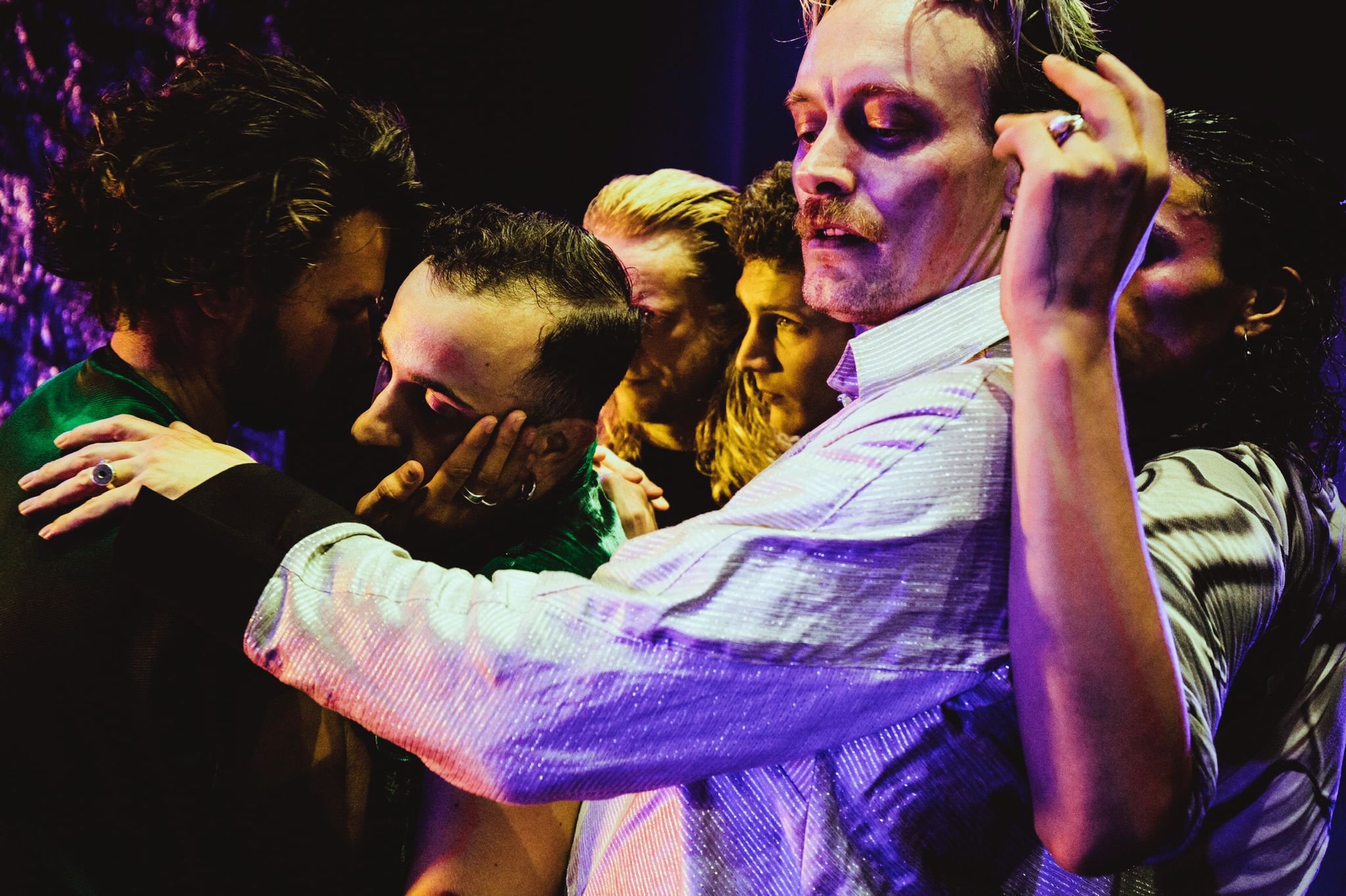
the wild stage
How green is the grass really on the other side of the curtain?
Where do we wander
If we won’t go inside?
A place parallel to everyday reality, where almost anything is possible, and the wildest dreams come true. That is not only the ideal image on which the fictional city of Mahagonny is based, but also the bottom line of most of today’s nightlife. During the roaring twenties, Bertolt Brecht and Kurt Weill’s six-song Mahagonny-Songspiel (1927) was a prelude to their opera Aufstieg und Fall der Stadt Mahagonny (1930). Both plays revolve around the dream city as the ultimate escape for jaded souls: a way out of the disillusionment under rising capitalism. In our own uncertain times, in which culture as a safe outlet is increasingly under threat, it was rumored that we were heading for our own version of those infamous, excessive twenties. Based on these predictions, The Wild Stage zooms in on the human desire to escape. How do we relate to ourselves and our surroundings through all kinds of escapades and escapisms with which we try to flee the doom of the daily grind?
Surrendering to the total work of art
The Wild Stage re-engages the utopian ideal of the Gesamtkunstwerk. From the viewpoint of co-creation, musicians Casper Clausen, Timo Tembuyser, Adriaan de Roover and Baroque Orchestration X’s Jon Birdsong and Pieter Theuns experimented and improvised a composition that oscillates between baroque and electronic, contemporary and classical. The musicians’ entanglement with performers Matteo Sedda, Rob Hayden, Mustaf Ahmeti and Gustav Königs establishes an interplay of leading and being led through movement and music. This blurring of borders is an inherent part of oester’s artistic vision, which doesn’t want to get bogged down in the theatre-historical weight that the notion of the total work of art invokes. Rather, the bringing together of artists with very different profiles aspires to lure both performers and musicians out of their comfort zone. By giving them a clean slate, whilst still offering a shared space – physically and mentally –, everyone is challenged to explore the limits of collective creation. The Wild Stage departed from a romanticized image of collective ecstasy in the interwar Berlin cabaret scene. The current fascination with this particular aesthetic can easily be dismissed as superficial, but in dialogue with the announced revivalof that period, it brings complex issues to the surface. If it is easier to imagine the end of the world than a way out of capitalism, as cultural theorist Mark Fisher states, is festive collectivity an alternative to the disciplinary machines that we find ourselves in? And how does the recurring motif of abundance and excess – a motif that also resonates with the baroque instruments used on stage – connect with the (existential) too much of the Anthropocene? The infinite pursuit of a permanent state of bliss therefore remains ambivalent in The Wild Stage. Do we wander through amorphous masses on a club night that each weekend increasingly resembles the weekend before? Or do we, from a spiritual point of view, keep entering a passage where beginning and end, life and death are intertwined, as the Tibetan Book of the Dead suggests? In the deep human reflex to escape, individual meaning and collective surrender are intertwined. The state of the stage
The wild is thought of as natural and uncultivated, as well as ferocious and extreme. In the light of escapism, wild can either point to a desire to undo something, to revolt against established systems and rules, to create an alternative or turn into an extreme, fatality-driven destruction. It also relates to an idea of “human nature”: are we essentially animalistic? Or does wildness unleash as a result of constraining man-made systems? The Wild Stage injects some affectivity and vulnerability into the stereotypical and often highly gendered attribute "wild". In contrast to conventional characterizations of wildness, the performance emphasizes the individual fluidity of identity as a whole, and seeks to create a space of heterogeneous, meandering masculinities. The 60-minutes trip of The Wild Stage crosses many phases – or rather, stages. The teasing of the fine line between theextreme pursuit of happiness and an escape from reality takes the form of a continuous process, a succession of stages. The suggestive scenes are constantly in transition, just as escapism in itself does not entail any fixed sentiment or interaction. The circular undertone of it all indicates how the performers are propelled by a collective experience, while still confronting each other in their individual and introspective states of being. The performance plays with a tension between going with the flow and against the grain, between flying high and falling low – until transgression tips over into transcendence: a highly sought-after exit sign in our current times. The creative process as a (confusing) sanctuary
In the end, the Mahagonny that remains testifies of the performers’ first-hand experiences of unbridled freedom. The generous white space that came with creating from scratch - only prompted by the evocative libretto of Ylona Supèr - appeared to be both a blessing and a curse for the creation process. During the rehearsal period, frictions gradually grew, just like in Brecht and Weill's fictional city. The process behind The Wild Stage thus reflects the shared yet very personal confusion that occurs without the grip of an overarching structure; a confusion that eventually transformed into a togetherness where egos dropped along the way. A working structure that is broken open, and that models itself on a process that gradually transforms and accumulates other interpretations, is a very vulnerable process, in which escape routes are inevitably mapped out. The Wild Stage's exploration of escapist urges is therefore far from formulating a final answer but hopes to foster a wild ecosystem in which it remains possible to escape into reflection.— Tessa Vannieuwenhuyze, Ylona Supèr & Anuschka Carl


